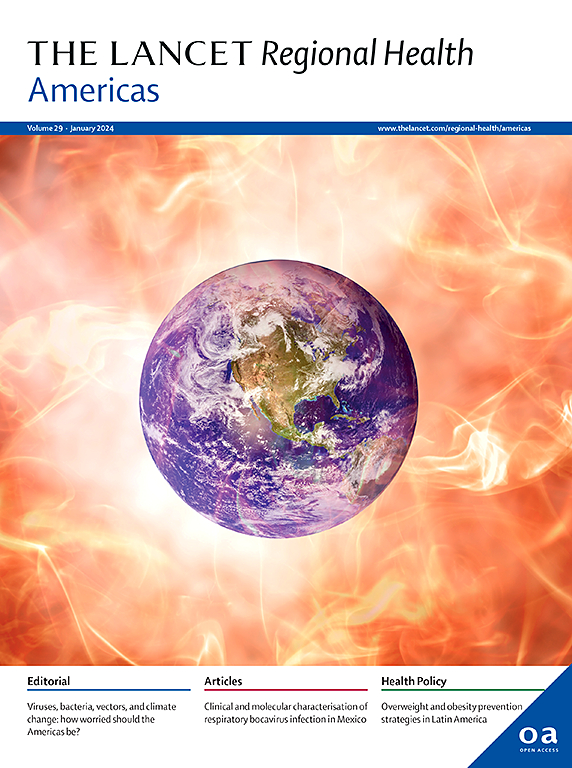评估单一定性粪便免疫化学测试对风险分层疑似结直肠癌患者结肠镜检查优先级和死亡率的影响:一项回顾性队列研究
IF 7
Q1 HEALTH CARE SCIENCES & SERVICES
引用次数: 0
摘要
背景:对疑似结直肠癌低或中度风险的有症状个体进行粪便免疫化学检查可以帮助优先考虑结肠镜检查的候选者。本研究的目的是评估粪便免疫化学试验(FIT)在有症状的低或中度结肠癌风险个体中的诊断准确性,并探讨其与生存率的关系。方法:我们于2016年12月至2024年7月在智利一家单中心公立医院进行回顾性队列研究。纳入成人(≥18岁),伴有提示结直肠癌症状并准备通过结肠镜检查进行评估的个体。有症状的疑似结直肠癌患者由训练有素的护士根据2015年NICE指南分层为高风险或低/中度风险。随后,高风险患者直接转诊进行结肠镜检查,而低/中度风险患者进行单次定性FIT,并根据结果优先进行结肠镜检查。主要结果为FIT对结直肠癌的诊断准确性、总死亡率和结直肠癌特异性死亡率。在1304名参与者中,共有394人(30%)被列为高风险。其余910例(70%)被归类为低/中度风险,并被转介进行FIT。其中,808人(89%)接受了FIT检测。FIT的诊断准确率为96%,特异度为66.8%,阴性值为99.8%。低/中等风险阳性FIT (FIT+)和高风险参与者的死亡率高于低/中等风险阴性FIT (FIT -)个体。时间-事件分析证实,低/中危FIT患者的累积死亡率较低。多变量Cox回归模型显示,30个月后,该组患者的死亡风险持续降低,而低/中等风险FIT+患者的死亡率增加趋势不显著。在低或中等风险的症状个体中,单个定性FIT与结直肠癌检测的高灵敏度和中等特异性相关。FIT可能有助于在低资源环境中优先考虑结肠镜检查,但需要进一步的前瞻性验证。本研究由ANID FONDAP 152220002 (CECAN)部分资助。本文章由计算机程序翻译,如有差异,请以英文原文为准。
Assessing the impact of a single qualitative fecal immunochemical test on colonoscopy prioritization and mortality in risk-stratified patients with suspected colorectal cancer: a retrospective cohort study
Background
Performing fecal immunochemical tests in symptomatic individuals at low-or moderate risk for suspected colorectal cancer could help prioritize candidates for colonoscopies. The objective of this study was to assess the diagnostic accuracy of the fecal immunochemical test (FIT) in symptomatic individuals at low-or moderate risk of colorectal cancer and explore association with survival.
Methods
We conducted a retrospective cohort study between December 2016 and July 2024 from a single-center, public hospital in Chile. Adults (≥18 years-old) individuals were included, those with symptoms suggestive of colorectal cancer and set for evaluation via colonoscopy. Symptomatic individuals with suspected colorectal cancer were stratified as high risk or low/moderate risk by a trained nurse according to 2015 NICE guidelines. Subsequently, high risk patients were directly referred for colonoscopies, while low/moderate risk patients underwent a single qualitative FIT and prioritized to colonoscopy based on results. Main outcomes were FIT diagnostic accuracy for colorectal cancer, overall mortality, and colorectal cancer-specific mortality.
Findings
A total of 394 out of 1304 participants (30%) were classified as high risk. The remaining 910 (70%) were categorized as low/moderate risk and were referred for FIT. From these, 808 (89%) individuals were tested and had results for FIT. Regarding the diagnostic accuracy of the FIT, sensitivity was 96% and specificity reached 66.8%, with a negative value of 99.8%. Low/moderate risk positive FIT (FIT+) and high-risk participants had higher mortality rates vs. low/moderate risk negative FIT (FIT−) individuals. Time-to-event analysis confirmed a lower cumulative mortality in low/moderate risk FIT− patients. A multivariable Cox regression model showed a consistently lower risk of death in this group, while a non-significant trend towards increased mortality was observed in low/moderate risk FIT+ individuals after 30 months.
Interpretation
In symptomatic individuals at low or moderate risk, a single qualitative FIT was associated with high sensitivity and moderate specificity for colorectal cancer detection. FIT may help prioritize colonoscopy in low-resource settings, but further prospective validation is warranted.
Funding
This research was partially funded by ANID FONDAP 152220002 (CECAN).
求助全文
通过发布文献求助,成功后即可免费获取论文全文。
去求助
来源期刊

Lancet Regional Health-Americas
Multiple-
CiteScore
8.00
自引率
0.00%
发文量
0
期刊介绍:
The Lancet Regional Health – Americas, an open-access journal, contributes to The Lancet's global initiative by focusing on health-care quality and access in the Americas. It aims to advance clinical practice and health policy in the region, promoting better health outcomes. The journal publishes high-quality original research advocating change or shedding light on clinical practice and health policy. It welcomes submissions on various regional health topics, including infectious diseases, non-communicable diseases, child and adolescent health, maternal and reproductive health, emergency care, health policy, and health equity.
 求助内容:
求助内容: 应助结果提醒方式:
应助结果提醒方式:


